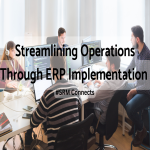Background:
Our client, a leading manufacturer and distributor, faced operational inefficiencies due to reliance on manual processes and the use of disparate systems that hindered seamless communication between departments. They sought a comprehensive solution to streamline their business processes, enhance efficiency, and gain real-time insights into their operations.
Client Objectives:
Process Optimization: Streamline and automate key business processes to eliminate manual errors and improve overall efficiency.
Integrated System: Implement an integrated ERP system to centralize data and facilitate seamless communication across various departments.
Real-time Visibility: Gain real-time visibility into inventory, production, and financial data for informed decision-making.
Scalability: Implement a solution that can scale with the company's growth and evolving business requirements.
Our Approach:
Needs Assessment: Conducted a detailed analysis of the client's existing processes, pain points, and future business goals to tailor the solution accordingly.
Customized ERP Solution: Designed and implemented a customized ERP system that addressed the specific needs of the manufacturing and distribution workflows.
Integration: Integrated the ERP system with existing software applications to ensure a smooth transition and minimize disruption to daily operations.
User Training: Conducted comprehensive training programs for employees at all levels to ensure a smooth adoption of the new system.
Ongoing Support: Provided continuous support and maintenance to address any issues and ensure the optimal performance of the ERP system.
Results:
Efficiency Gains: Automation of manual processes led to a significant reduction in errors and improved overall operational efficiency.
Real-time Insights: The integrated ERP system provided the client with real-time visibility into inventory levels, production schedules, and financial data, enabling data-driven decision-making.
Scalability: The implemented solution proved scalable, accommodating the company's growth and evolving business needs without disruptions.
Cost Savings: Operational efficiencies and streamlined processes resulted in cost savings, contributing to improved profitability.
Enhanced Customer Satisfaction: Faster order processing and improved inventory management led to better customer service and increased satisfaction.
Conclusion: The successful implementation of the ERP system not only addressed the client's immediate operational challenges but also positioned them for sustained growth and competitiveness in their industry. The case exemplifies the transformative impact of strategic ERP implementation on business processes and overall organizational success.



